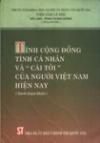
DO Long and PHAN Thi Mai Huong (eds.)
Hanoi: Chinh Tri Quoc Gia Publisher, 2002, 316 pages
Reviewed by Hoang M. To Nga, Lecturer in Psychology, College of Social Sciences and Humanities, Vietnam National University – Ho Chi Minh City; Harvard-Yenching Institute Doctoral Scholar
This book presents research findings on collectivism, individualism and the self in the Vietnamese context. Although these topics have long been a subject of interest to researchers in North America and Europe, they have engaged Vietnamese psychologists’ interest only recently. This book was the first study of collectivism, individualism and the self from a psychological perspective in the context of Vietnamese culture. Since personality and social psychology had previously been studied from a Marxist angle, this work marked a major innovation, opening the door to a much wider range of theories and findings.
The first part of the book reviews personality and social theories of the self from psychodynamic, Adlerian, existential, humanistic, cognitive, social learning and behavioral perspectives. From these perspectives, the authors discuss the concepts of collectivism and individualism in cultural psychology, the importance of studying collectivism and individualism in the Vietnamese context, and the methodology typically chosen to conduct research in this field. Collectivism and individualism are seen on a continuum in talking about the self, not as two polar opposites. The second part shifts the focus to the points of view on collectivism and individualism in the research studies on Vietnamese literature.
The next section presents research findings by psychologists at the Hanoi Academy of Psychology. Their findings show that despite cross cultural interactions, collectivism still prevails over individualism among Vietnamese as compared with other nationalities such as Americans, Japanese, and Koreans. However, the dimension of collectivism and individualism varies according to gender, situations and sub-cultures of geographical regions. Generally speaking, Vietnamese women are found to be more collectivist than men, but these two variables are complicated when it comes to different sub-cultures of the North and the South, rural and urban areas, the King (the main race of Vietnam) and other minority people. Moreover, collectivism and individualism in the Vietnamese value system differ substantially from behaviors in actual situations.
The book closes with practical recommendations for further study and suggests a rational view of collectivism and individualism as complementary dimensions in the same person, provided that each dimension is positively developed.
The principal limitation of the book lies in the process of sampling and generalizability of the study, which is also acknowledged by the authors. Nevertheless, the book is a very helpful reference for scholars in the field of psychology and related research domains.
